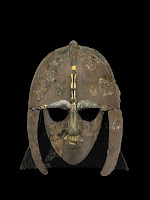 The launch of a new collaboration between the British Museum and the BBC, the ambitiously titled, A History of the World took place, appropriately, in the Enlightenment Room of the BM this morning. It’s actually a History of the World ‘in 100 objects’ and the daily, 15-minute programmes will be broadcast on Radio 4 from January 18th 2010. Each one focuses on a particular object from the museum’s collection and the series will cover a wide chronological and geographical period.
The launch of a new collaboration between the British Museum and the BBC, the ambitiously titled, A History of the World took place, appropriately, in the Enlightenment Room of the BM this morning. It’s actually a History of the World ‘in 100 objects’ and the daily, 15-minute programmes will be broadcast on Radio 4 from January 18th 2010. Each one focuses on a particular object from the museum’s collection and the series will cover a wide chronological and geographical period.Neil MacGregor, the BM’s director talked of moving away from history centred on the Mediterranean – once, literally, the ‘middle of the earth’ – to create a genuinely global history, beginning with an ancient chopper from the Olduvai Gorge in modern-day Tanzania, that tells us much about the ideas of early man. Some of the objects are especially beautiful: the colossal statue of Rameses II, for example; others, less so, but huge in their importance. Three rather ugly stubs of metal turn out to be remnants of the first transatlantic cable, created as one single 4,000-mile long object created in east Birmingham, transported to Bristol in a remarkable feat of logistics, and then laid along the bed of the ocean to join the Old World with the New for the first time. The series will be supported by an impressive interactive website with high resolution images and a children’s TV series, Relic: Guardians of the Museum.
What is especially encouraging about this series from a historical point of view is that it reaches wide and far. I have bemoaned before (and will do so again) about the elision of history with current affairs, a trend of which BBC television (and not radio) has been especially guilty. But this is a wholly admirable adventure, real history despite the inevitable roping in of ‘celebrities’: though a definition of celebrity capacious enough to include Seamus Heaney reading his translation of Beowulf, Wole Soyinka and Madhur Jaffrey is one I can live with.
 One caveat was raised at the press conference. After all the talk of outreach and accessibility, why is A History of the World not being broadcast on BBC1 television, easily the BBC channel with the largest audience? Mark Damazer, controller of Radio 4, a station on a roll at the moment, talked of budgetary limitations. But the truth is, the BBC and the BM know their audience – one reason why they are so good at what they do – and it is predominantly made up of the ‘interested’ middle classes. With a third of schools failing officially to provide a decent standard of education, that’s not going to change anytime soon.
One caveat was raised at the press conference. After all the talk of outreach and accessibility, why is A History of the World not being broadcast on BBC1 television, easily the BBC channel with the largest audience? Mark Damazer, controller of Radio 4, a station on a roll at the moment, talked of budgetary limitations. But the truth is, the BBC and the BM know their audience – one reason why they are so good at what they do – and it is predominantly made up of the ‘interested’ middle classes. With a third of schools failing officially to provide a decent standard of education, that’s not going to change anytime soon.Talking of education, in the Times today, History Today contributor Andrew Roberts provides a crash course in history books for Baroness Ashton, the EU’s new foreign affairs supremo. Any list that contains Chris Wickham’s magisterial study The Inheritance of Rome (Penguin) and A World by Itself (Heinemann), the forthcoming history of the British Isles edited by Jonathan Clark (which he discusses in the January edition of History Today) gets my thumbs up.

No comments:
Post a Comment